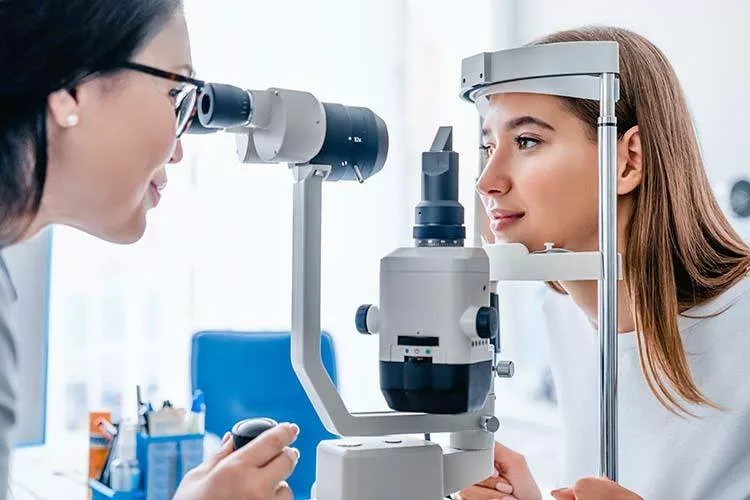Trusted Eye Doctor Montgomery for Vision Treatment
Trusted Eye Doctor Montgomery for Vision Treatment
Blog Article
The Significance of Regular Eye Tests: Insights From an Experienced Eye Medical Professional
Regular eye examinations serve as a crucial component of healthcare that expands beyond mere vision adjustment. A knowledgeable eye physician can offer insights right into how these evaluations not just detect typical eye conditions however additionally disclose underlying wellness issues that may otherwise go undetected.
Advantages of Routine Eye Examinations
Although lots of people may forget the importance of regular eye examinations, these evaluations play a vital function in keeping overall health and wellness and health. Regular eye assessments offer not just to evaluate vision but also to discover early indications of systemic wellness problems, including diabetes and hypertension. By recognizing these problems at their beginning, individuals can obtain prompt interventions, dramatically enhancing long-lasting end results.
Furthermore, eye tests can help in checking existing health problems, ensuring that any type of modifications in vision or eye wellness are without delay dealt with (optometrist). The assessments permit personalized referrals regarding glasses, way of living adjustments, and protective actions versus potential eye pressure or damages
Beyond physical health, the benefits of regular eye tests include boosting lifestyle. Improved vision promotes much better performance in daily activities, from reading to driving, thus contributing to greater self-reliance and safety and security. Ultimately, prioritizing eye examinations cultivates an aggressive method to health and wellness management, equipping people to take fee of their health. Regular check-ups are an important element of a detailed health care strategy, ensuring that both vision and overall wellness are preserved throughout life.
Common Eye Conditions Detected
Normal eye tests contribute in spotting a selection of typical eye conditions that can significantly impact vision and total health and wellness. Among one of the most prevalent problems identified during these assessments are refractive errors, consisting of myopia (nearsightedness), hyperopia (farsightedness), and astigmatism. These conditions typically show up as obscured vision and can be quickly corrected with prescription glasses or call lenses.
Another common concern is glaucoma, a group of eye diseases that damage the optic nerve, usually linked to increased intraocular pressure. Early detection is crucial as it can prevent irreversible vision loss.
Age-related macular degeneration (AMD) is an additional significant problem that impacts main vision, specifically in people over 50. Lastly, diabetic retinopathy, an issue of diabetes, can lead to serious vision impairment otherwise kept track of routinely. Through extensive eye examinations, these conditions can be recognized early, permitting timely monitoring and treatment to maintain vision and boost lifestyle.
Value of Early Discovery
Very early detection of eye conditions plays a vital function in protecting vision and avoiding significant wellness difficulties. Lots of eye conditions, such as glaucoma, diabetic person retinopathy, and age-related macular deterioration, can advance calmly without obvious signs and symptoms in their onset. By the time signs and symptoms materialize, irreparable damages might have occurred, causing irreversible vision loss.
Regular eye exams facilitate very early medical diagnosis, permitting prompt treatment and treatment. For example, dealing with raised intraocular stress can stop the onset of glaucoma, while taking care of blood glucose degrees can dramatically minimize the danger of diabetic person retinopathy. Additionally, problems like cataracts can be successfully our website handled with medical intervention when identified early.

How Frequently Should You Go To?
Identifying the frequency of eye exams is crucial for keeping optimal eye health and vision. The basic recommendation for adults is to have a comprehensive eye exam each to two years, relying on individual risk elements and age. For people matured 18 to 60, an examination every 2 years is usually adequate if no vision issues exist. However, those over 60 must think about annual examinations, as the threat of age-related problems increases dramatically.
Individuals with particular danger aspects, such as a family history of eye disease, diabetes, or existing vision troubles, may need even more constant examinations. Youngsters should find more have their initial eye exam at six months old, complied with by added examinations at age three and before getting in college. Normal check-ups during childhood are vital as vision can transform quickly during developmental years.
Ultimately, the regularity of brows through should be tailored to every individual's situations, including lifestyle, job-related hazards, and any kind of pre-existing eye conditions. Consulting with an eye care expert can offer tailored referrals, making sure that your eye health and wellness is consistently checked and preserved.
Tips for Your Eye Exam
Preparing for your eye examination can enhance the performance of the browse through and make sure a comprehensive assessment of your eye health and wellness. To optimize your time with the eye medical professional, it is critical to gather relevant details before your consultation. Beginning by putting together a checklist of any kind of medicines you are currently taking, consisting of over-the-counter drugs and supplements, as these can affect eye wellness.
In addition, record any symptoms you have actually experienced, such as obscured vision, discomfort, or frustrations. This details will help your ophthalmologist in identifying prospective problems. If you wear glasses or get in touch with lenses, bring them along, also if you do not use them on a regular basis. This will aid the medical professional evaluate any type of modifications in your vision. have a peek at these guys
It is likewise valuable to have a family members history of eye problems handy, as genetic factors can contribute to your eye wellness. Ultimately, take into consideration arranging your examination temporarily when you are much less rushed, allowing you to ask concerns and discuss your issues extensively. By preparing effectively, you ensure that your eye exam is efficient which your ophthalmologist has all the needed info to provide the most effective care feasible.

Conclusion
Routine eye exams play a vital duty in keeping both vision and overall health and wellness. They promote the very early detection of different eye conditions and systemic concerns, permitting timely intervention. The referrals for frequency highlight the significance of proactive treatment. Executing easy preparatory tips can enhance the examination experience. Eventually, focusing on extensive eye assessments contributes dramatically to the conservation of vision and the enhancement of top quality of life, underscoring the need of regular eye care in preventive medical care strategies.
Regular eye exams are critical in finding a range of usual eye problems that can significantly influence vision and general health and wellness.Figuring out the frequency of eye exams is important for preserving optimum eye health and vision.Preparing for your eye exam can improve the efficiency of the check out and make sure an extensive assessment of your eye health and wellness (optometrist). By preparing effectively, you ensure that your eye examination is effective and that your eye medical professional has all the essential details to provide the ideal treatment possible
Inevitably, focusing on detailed eye assessments adds considerably to the preservation of vision and the improvement of high quality of life, underlining the requirement of regular eye care in precautionary medical care techniques.
Report this page